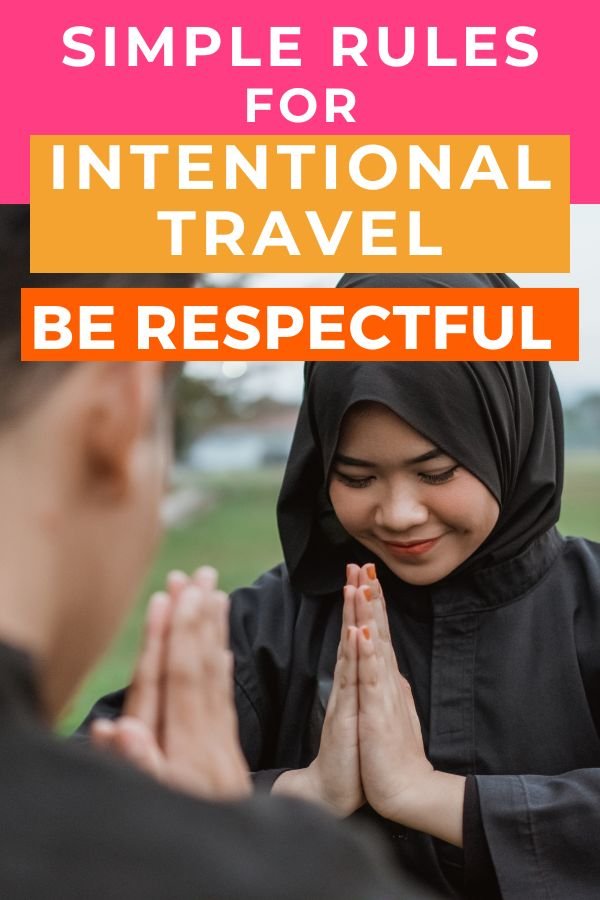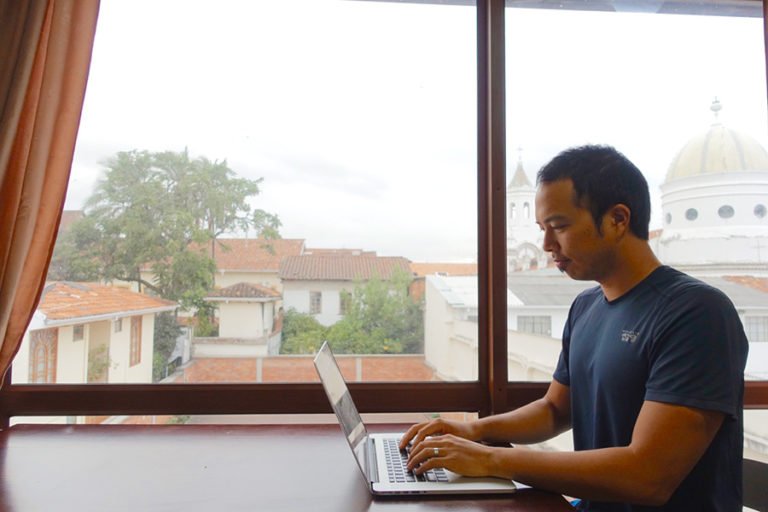Rules for Intentional Travel: Be Respectful
This is a guest post by Ingrid Hannan in our series, Simple Rules for Intentional Travel, by – and for – intentional travelers.
Rule #5: Be Respectful
Simple enough. Be polite, show reverence to elders, be gentle around children, say please and thank you.
Learn etiquette rules so you don’t go around offending people by pointing with the wrong appendage or cursing unknowingly.
In much of Southeast Asia, it’s rude to touch other people’s heads because they have long-held beliefs about the crown of the body being sacred. And in many places, monks follow strict rules about contact with the opposite sex.
I repeat once again: think about it from the perspective of others!
Maybe you don’t understand the basis for some cultural norm, but you’ve still got to follow it or your going to look like an insensitive jerk.
Here in the U.S., we might not take too kindly to being cut in line, even if it’s by a foreigner who isn’t used to that kind of practice.
Can’t quite figure out what’s wrong or right? There are dozens of places to find that info with a quick Google search for most countries’ etiquette standards, and most guidebooks have a section with this info.
Read our list of cultural things to learn before visiting a new country >
Here, the old adage “When in Rome…” applies. Did everyone take their shoes off at the door? Off with your boots! Has everyone in the restaurant left a tip? Give a little extra!
Not all these practices and customs are obvious, but being observant and asking questions can’t ever hurt.
Why is it important to be respectful when traveling?
While visiting a place, respecting local culture is more than just a courtesy—it’s a passport to richer experiences. Here are five reasons why cultural respect matters:
Making Authentic Connections
Embracing local customs fosters meaningful interactions, allowing you to connect deeply with the people and communities you encounter.
Smoother Cross-Cultural Interactions
Being considerate of cultural norms helps you navigate unfamiliar terrain smoothly, reducing the chances of unintentionally causing offense.
Preserving Diversity
Every culture is a treasure trove of history and heritage. Respecting these traditions contributes to the preservation of global diversity and the stories that make each place unique.
Spreading Positive Vibes
Being a respectful traveler leaves a positive impact. Your actions inspire a ripple effect of goodwill, promoting open-mindedness and mutual understanding across borders.
How to be respectful when traveling
Here are some ways to show respect to the culture of a place you’re visiting.
Research Before You Go
Learn about the culture’s customs, traditions, and taboos to avoid unintentional disrespect and navigate interactions thoughtfully.
Observe and Imitate
Watch how locals behave and follow their lead. If they remove their shoes before entering a home, do the same; if they lower their voices in certain settings, adapt accordingly.
Dress Appropriately
Dress respectfully, adhering to local norms, especially in conservative regions or religious sites. This shows awareness and consideration for their values.
Mind Your Gestures and Language
Understand local gestures and avoid offensive body language. Also, learn a few polite phrases in their language—it goes a long way in building connections.
Be Open and Curious
Embrace differences with a genuine curiosity. Ask questions, seek to understand, and engage in cultural exchanges, showing respect for their way of life.
What surprising cultural customs have you encountered abroad? Have you ever committed a cultural faux pas on accident? We’d love to hear your thoughts in the comments section below.
Simple Rules to Lighten Your Cultural Footprint
- Learn (at least some of) the language
- Smile and greet people according to local custom
- Avoid resorts
- Stay a while
- Be respectful
- Spread the wealth
- Ignore the party scene
- Shift focus from taking to giving
- Go for a walk
- Befriend locals
 About Ingrid: Ingrid is a wanderlust at heart. She’s lived all up and down the west coast, studying environmental science and Spanish at the University of Portland and studying how to grow vegetables in Colorado and Washington.
About Ingrid: Ingrid is a wanderlust at heart. She’s lived all up and down the west coast, studying environmental science and Spanish at the University of Portland and studying how to grow vegetables in Colorado and Washington.
Her favorite activities include rock climbing, eating ice cream, and writing letters. Her travels have taken her from the Caribbean to East Asia and many destinations inbetween. The next places she hopes to travel to are New Zealand, Japan, and Norway.
You might also like these posts:
– Important cultural things to learn about a country before visiting
– How to have authentic, meaningful travel experiences in touristy areas
– 10 Ways to Make Your Travel More Sustainable
– Our Guide to Meeting Locals and Like-Minded Travelers
Like this post? Pin it for later or share with a friend!









